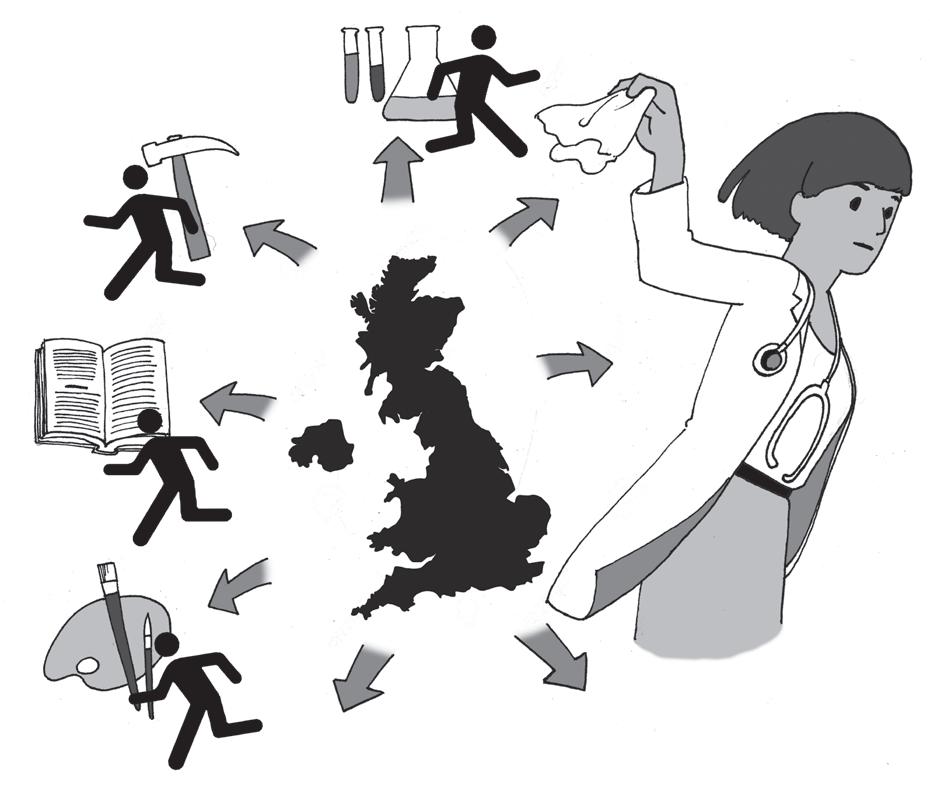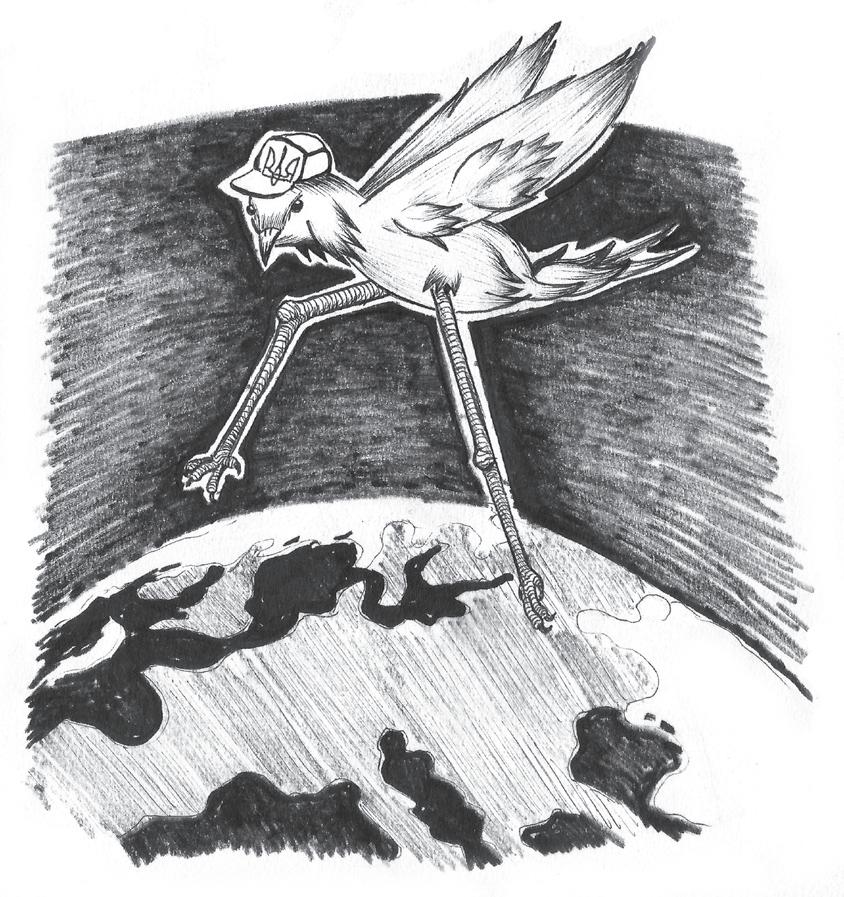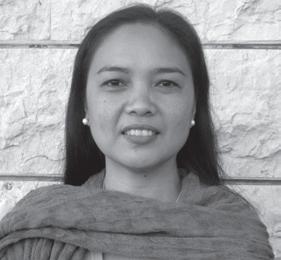
9 minute read
Transition Work: Towards a Stable and Sustainable WSCF
from Mozaik 37/2018 - (I)migrant: Perspectives of minority integration in Europe PART 2
by WSCF-Europe
“The wscf has faithfully served students of the ecumenical movement for over a century. Thousands of ecumenical, civil society and social movements credit the Federation with empowering them in their quest for social justice and firm ecumenical relations.”1 In recent interviews with wscf partners and ecumenical organizations, they agreed that the wscf has been effective in “equipping students and young people to provide ecumenical leadership now and in the future with the explicit characteristic of being centered on justice and advocacy.”2
Undoubtedly wscf has been faithful to its mission and vision over the years and has celebrated the various milestone of its life as a global ecumenical youth movement. It has weathered through the most challenging times, both internal and external, in different periods of its history. Today, with six fully functioning regional structures supporting more than 100 member movements spread throughout all the continents in the world, the unique grassroots character of wscf is a testament of the diversity of witness it has provided and lived-out among various Christian student and youth communities in various contexts. It is the diversity the scm witness and dynamism of the grassroots movement that has been the core of the life of the Feder- ation fulfilling the defining wscf motto, “Ut Omnes Unum Sint” (that they may all be one, John 17:21). In contrast with the concept of globalization, driven by the homogenizing ideology of dominant neoliberal capitalist economic model, wscf celebrates the diversity of life in Christ, the complex and multiple ways in which Christian Faith is lived-out and contextualized in the different scms all over the world.
Advertisement
Today however, the Federation is faced with yet another challenge that has threatened the very core of its existence, its sustainability and stability in the future.
Over the years the financial standing of the Federation has declined. Its core budget relied heavily on external funding coming from traditional funders that have themselves been experiencing financial challenges due the changing global financial landscape. Given the reach and depth of wscf’s human resources, it has not fully maximized the potential capacity of its constituency to mobilize for its financial sustainability. Even with the establishment of the wscf Centennial Fund in 1995 which aimed to support and ensure the financial future of the Federation, the financial standing of the Federation continued to decline.
As an organization, its structure needs to evolve into a more effective and efficient vehicle to make decision and carry-out actions in order to stay relevant and responsive the challenges of the time. Over the years, wscf has experienced financial challenges that has threatened the survival of its structure in its current form. The recurring crisis has led to the postponement of the gathering of its highest policy-making body, the 35th General Assembly (ga). Recognizing the need to address this situation, the Executive Committee formed a Task Force for the Future of the Federation to study the situation carefully and present proposals for a change for the ga’s consideration.
The analysis of the wscf Future of the Federations (FoF) Task Group, presented in the wscf’s 35th General Assembly in Bogota in March 2015, described the situation of as the following, the “recurring financial crisis is a symptom of a deeper crisis in the Federation. The financial situation of the Federation has eroded over the years, so too has the clarity of its vision and purpose, the trust and confidence of its officers and executives, the relationship between the regional and the inter-regional offices. Sustained financial problems have resulted in years of increasing deficit and debt. Lack of clarity of function and responsibility has compromised the opportunity to tackle these seemingly intractable problems meaningfully and advance the work both regionally and inter-regionally. Relations with donors have soured in some cases and stronger project management skills are called for.” (Future of the Federation report to wscf ga, Bogota Colombia, 2015)
Following this analysis, the Bogota ga approved a Transition Plan with the following measures to begin the process:
• Articulate our common global vision and mission understanding for wscf (including global and regional priorities and concerns).
• Reform governance structure and constitution.
• Improve reporting and documentation of all wscf activities and events.
• Improve trust and communication between the
Inter-regional Office (iro), Executive Committee, Regional offices, scms and partners and donors.
• Rebuild trust and communication with traditional and new donors.
• Increase the income of the wscf (iro and Regional).
• Clarify roles, responsibilities and line reporting arrangements for staff at different levels (gs, Chairperson, Exco, Regional Secretary, scms).
• Improve the capacity of the iro, regional staff and ExCo members.
• Implement a process to consider the move of the iro, or, to relocate the Inter Regional staff to a more cost efficient location.
To implement and operationalize these recommendation, the Bogota ga also proposed a 6-months interim transition from April to Sept 2015, which later on was extended another 3 months until December 2015. This 9-month interim transition period was led by a group called the Transition Team. The overall purpose of the work of the interim Transition Team was to lead and prepare the transition towards substantial change in the systems and structures of wscf in order to ensure its sustainability and stability at the end of a two-year period. The Interim Transition Team was mandated to develop and propose processes to reform first the (1) Governance Structure and second, the (2) Operational Systems of wscf from its current form and function. These reform processes are mutually inclusive and should be implemented simultaneously. Furthermore, The Transition Team’s role is to ensure that the nine (9) objectives set forth in the “Measures necessary in the next two years” (Future of the Federation Task Group Recommendation) will be achieved at the end of two years. The Interim Transition Team will implement the recommendations of Future of the Federation Task Group approved by the ga. It shall report to the Executive Committee in this six month transition period.
In the wider conversation of internal structural reform, the proposals addressed the following: movement building should be at the heart of the work of the Staff Team; the revised structure should encourage greater participation, democratic decision-making and communication between the global, regional, and national movements; the need for clarity and stream-lining of bureaucratic processes in decision-making; a reduced and lean operational structure that is flexible and able to adapt to the changing needs of the Federation.

In specific terms this meant the following immediate actions, the majority of which required constitutional amendment changes:
• Changing from two Co-Generals Secretaries to one Secretary General (Constitutional amendment change)
• Re-focus the work of the six regional staff to movement building and strategic programming with a change in the title of the Regional Secretaries to Regional Executives and Global Program Directors (Operational change)
• Remove the provisions for the two proxies for regional representatives in the ExCo to reduce the number of regional representatives in the global structure (Constitutional change)
• General Assembly held every after six years of interval instead of four (constitutional change);
• Global operational work performed by the General Secretary will move to one of the regional office of the wscf; Regional offices conduct study of office locations (operational change)
• Integrate the reporting and accounting system of the six regions following the global standard and format (operational change)
• Online General Assembly as Extra-ordinary Assembly to amend the wscf Constitution (Constitutional change)
• Approval of the Strategic Plan 2016 to2019 (operational change)
• 2016 Budget approved and financial Solidarity agreed with the regions: 15% Contribution from regions to the core budget and expenditure (operational change)
transition time-line
→ may-dec 2015 (nine-months): From the Future of the Federation (FoF), the Transition Team carried forward the Bogota ga decision and preparation work; its objective was to develop the details of Transition Proposal for the ExCo’s approval.
→ august 2015: Staff and Officers Strategic Workshop in Birmingham to develop and bring together the four-year Strategic Plan and Transition Plan.
→ dec 15 2015 (two-years): wscf ExCo In-face Meeting and Transition Meeting in Palermo approve the Transition Proposals contained in the Palermo Communiqué. ExCo took-over leadership from the Transition Team and began implementing the proposals.
→ march 2016: On Exco election of Chairperson Georgine Djuetane, Vice-chairperson Salma Charaf, General Secretary Necta Montes elected by ExCo. General Secretary operation moved to Manila. Working Groups Formed: Constitutional Commission, iro location/relocation, Joint Fundraising Working Group.
→ june 2016: Officers and Staff reviewed the 2016 Palermo Budget, made some adjustments noting the lack of income from 15% Admin cost, emw funding reduced.
→ july 2016: ExCo Meeting, mid-year review of financial situation, 50% staff salary cut approved, ExCo appeal for support from the regions. Staff Model Working Group proposed.
→ aug – sept 2016: 2 Exco Meetings, Talks and negotiations with the wscf regional leadership regarding staff contracts and salary reduction.
→ october 2016: ExCo Meeting, regional reports on the ExCo appeal, first report from the Staff Model Working Group.
→ december 2016: Staff and Officers Assessment and Planning, review and adjust the Transition Plan and finalize the Strategic Plan, Staff Model presentation, 2017 Budget presentation and agreements summary of what has been accomplished thus far?
→ december 29 2016: On ExCo Meeting on wscf cf Loan Agreement, Staff Model Working Group 2nd report, 2017 Budget proposal discussion, internal debt discussion.
☑ Paid-off debt to the World Council of Churches (wcc) in January 2016 (Bogota 5)
☑ Adopted new Job Descriptions and changed the titles of the staff to reflect the gradual shift to a new staff model with a program focus direction of the Strategic Plan. (Palermo 2, Bogota 8)
☑ Relative stability by prudent financial control, reduced global operating cost by closing 3 offices in Geneva and moving to Manila and other cost-reduction measures (Bogota 9, Palermo 5)
☑ iro office and regional office relocation studies reports completed and submitted to the ExCo in March 2017 for approval and decision. (Palermo 5)
☑ wscf Online ga conducted and completed May 22 to 28,2017. 60 delegates participated to vote on 17 amendments submitted by ExCo, scm Norway, scm hk 5 amendments passed. (Palermo 7, 1)
☑ 2016-2019 wscf Strategic Plan completed, popularized and regional action plans calibrated. (Bogota 1, Palermo 8)
☑ Funding report back-log cleared/submitted (3 Annual Reports, ga Report and Project Reports), standardized and regularized and documentation has improved, maintained core funders support for2-year transition work: emw, ucc, uk Methodist, Waldensian Church Otto-per-Mille and Centennial Fund (Bogota 3, 5)
☑ Financial solidarity from regions formalized in 2017 Budget with admin regional contributions approved. Financial information integration preliminary work in developing a standardize financial reporting format (Palermo 9, 6)
☑ wscf new Staff Model proposal version 2 with inputs from regional leaders and staff. (Palermo 2)
☑ Hired a fund-raiser in April 2017 with Centennial Fund support (Bogota 6)
Conclusions
In less than two years of transition work, we planted the seeds of transforming the structure, management and organizational culture in the Federation in order to respond to the movements, renew our prophetic role, and demonstrate good stewardship of resources. Under very difficult financial circumstances, we demonstrated our ability to sustain ourselves with a functioning governance structure and continue with our core programmatic work of leadership formation, movement building, advocacy and solidarity, networking.
We consolidated and redirected the regional program direction of the Federation towards the Strategic Plan as the over-all framework. This became the tool for fundraising for programs, which will hopefully increase our capacity to support core expenses for staff salaries in the coming years.
In this period, we explored different ways of working to accomplish the different aspects of the Bogota and Palermo mandates. Significant roles played by senior friends working with ExCo members serving in different capacity in the four working groups formed, Constitutional Commission, Fundraising Working Group, Staff Model Working Group, iro location/relocation Working Group.
There is much to be done to ensure that the full-range of recommendations both from Bogota General Assembly and Palermo Executive Committee are fully implemented. In this process, challenges arises and inherent problems and contradictions surface.
what are the key challenges in the next two years?
1. The Federation needs to develop a common understanding of the change process, the meaning and intent of Culture Change in the context of our organizational transition, and its scope within the Federation. We must develop plans or strategies how to go about this internal change from global, regional and national levels.
2. Building Financial Solidarity within the family of the Federation, by resourcing ourselves from within our family remains a challenging task. Our experience in 2016 indeed confirmed that we will have to rely on ourselves for our survival especially in critical periods.
3. The transition and change cannot work without the regional structures cooperation and self-understanding. There is a need to develop understanding and synchronize, both the global and regional structures. We need to evaluate the functions and roles of the regional structure vis-àvis the changes in the global structures in order to function as a cohesive organization.
4. Re-skill and re-orient the role and function of the Staff Team and Executive Committee to meet new expectations and needs of the changes that has been implemented or will be implemented further.
5. The process of developing the wscf Staff Model based on the Strategic Plan is a key component in the implementation of the next two years post transition. It is therefore important to take into consideration the long-term financial, structural, programmatic implications and practical impact of the new model that will be put in place after the transition period.
Necta Montes, wscf general secretary, is from the Philippines and is a member of the United Church of Christ. Necta was previously the regional secretary for wscf Asia-Pacific, and project coordinator of the wscf Asia-Pacific Regional Women’s Program Executive Committee member.







